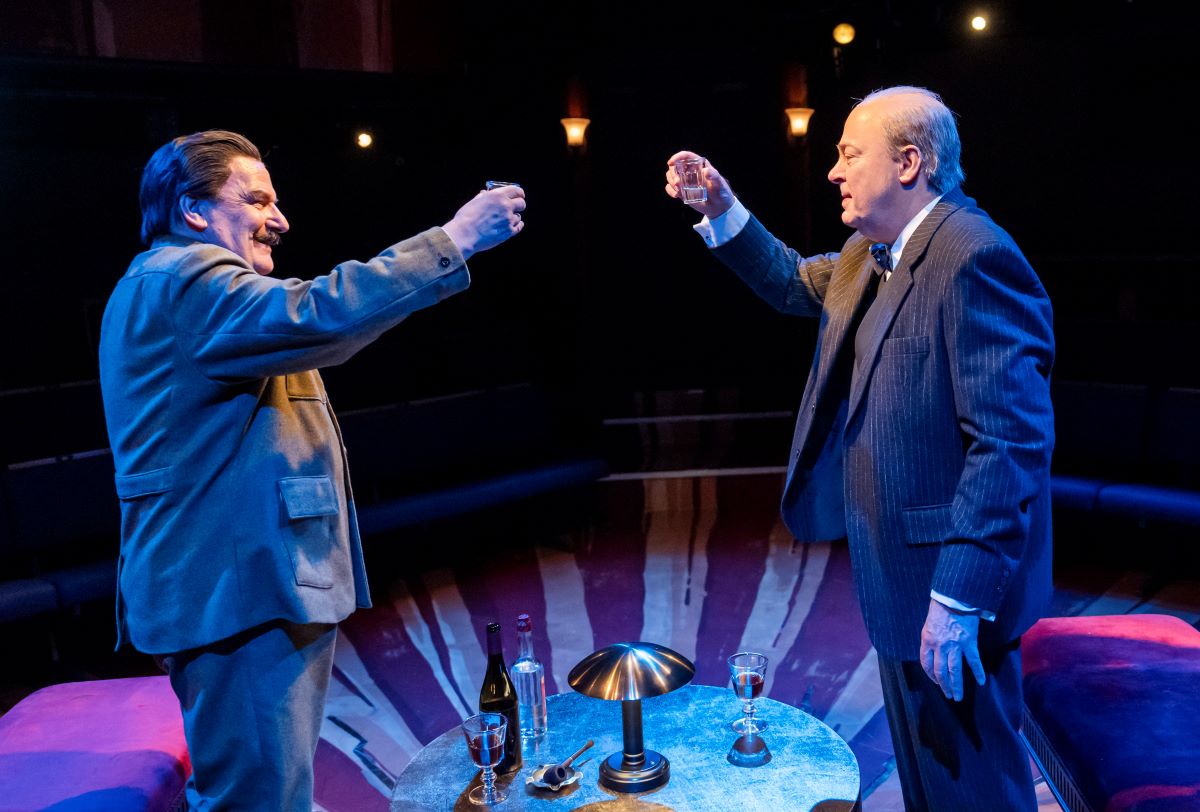In Churchill in Moscow, playwright Howard Brenton and director Tom Littler deliver a compelling portrayal of one of World War II’s most crucial moments: the first meeting between Winston Churchill and Joseph Stalin in August 1942. Set against the backdrop of a war on the precipice, the play explores political tension, mutual distrust, and the eventual forging of an unlikely but pivotal alliance between two of history’s most formidable figures.
The performance opens with a striking musical blend of military and uplifting sounds composed by Max Pappenheim, which sets the tone for a politically charged drama infused with moments of unexpected humour. The fusion of levity and tension creates a unique atmosphere, cleverly balanced so that the historical significance of this secret meeting between Churchill and Stalin never feels diminished, even when moments veer toward the absurd.
Roger Allam’s portrayal of Churchill is masterful, capturing both the wit and the gravitas of the British Prime Minister with an effortless charm. He balances the statesman’s characteristic arrogance and bombast with moments of vulnerability, offering a nuanced performance that anchors the play. Allam captures the complexity of Churchill’s humanity, particularly in moments of vulnerability, such as when the character resorts to alcohol to cope with the diplomatic tension. It is in these moments of intoxication that Churchill and Stalin find a surprising camaraderie—their shared enjoyment of wine and food slowly dissolves the walls of distrust. In this lubricated state, the two men evolve from wary adversaries to collaborators, a testament to how much of diplomacy is shaped by personal connection and the ability to transcend rigid protocols.

One of the most captivating aspects of the play is its portrayal of Joseph Stalin. Far from the purely ruthless, cold-blooded tyrant commonly depicted in the West, the Stalin of this performance is a far more nuanced figure—one capable of both warmth and wit. Peter Forbes’ masterful portrayal reveals Stalin’s many contradictions: the iron-fisted dictator responsible for the deaths of millions, yet also the pragmatic leader and father figure who is just as eager to strike a deal with Churchill as Churchill is to secure his support. Stalin provocatively reminds Churchill that brutality is not the sole domain of the enemy, pointing to the British Empire’s own bloody history of colonial violence as a counterpoint to his own crimes.
Julius D’Silva’s Molotov, Stalin’s right-hand man, expertly embodies the seasoned diplomat, balancing wit and humour with an unspoken sense of survival. Alan Cox’s performance as the British Ambassador to Moscow, Kerr, offers a sharp, understated portrayal that highlights the role of diplomats in facilitating behind-the-scenes negotiations. His quiet influence subtly shapes the course of events, demonstrating the critical yet often invisible work of diplomacy during high-stakes encounters.
The two female interpreters—Jo Herbert as Sally and Elisabeth Snegir as Olga—excel in their roles, introducing a feminine touch into a male-dominated world, bringing a distinct softness and richness to the unfolding narrative. Their evolving relationship, which transitions from precise professionalism to a more relaxed, selective approach as the leaders’ trust grows, elegantly mirrors the changing dynamics between Churchill and Stalin.
However, Svetlana, Stalin’s daughter (played by Tamara Greatrex), remains a somewhat underdeveloped character. Her portrayal, along with a wig that ages her beyond her years, seems disjointed with the narrative. While her appearance initially highlights a tender, paternal side to Stalin, her contributions—especially her references to Charles Dickens’ David Copperfield—feel out of place and add little to the core plot.
Churchill in Moscow is superbly directed and utterly engaging. This production proves that a secret political meeting can be both humorous and satirical while offering a deep, nuanced exploration of two powerful yet vulnerable figures—Churchill and Stalin. It invites us to reconsider our perceptions of these historical giants, reminding us that, even in the most critical moments, the line between political rivals and reluctant allies is rarely as clear-cut as we might assume.
By Howard Brenton
Directed by Tom Littler
Cast includes: Roger Allam; Peter Forbes; Alan Cox; Julius D’Silva; Jo Herbert; Elisabeth Snegir; Tamara Greatrex
Until: 8 March 2025
STREAM ON DEMAND FROM HOME
Watch online any time between 7.30pm on 11 March 2025 and 11.59pm on 14 March 2025
Photo credit: Tristram Kenton

